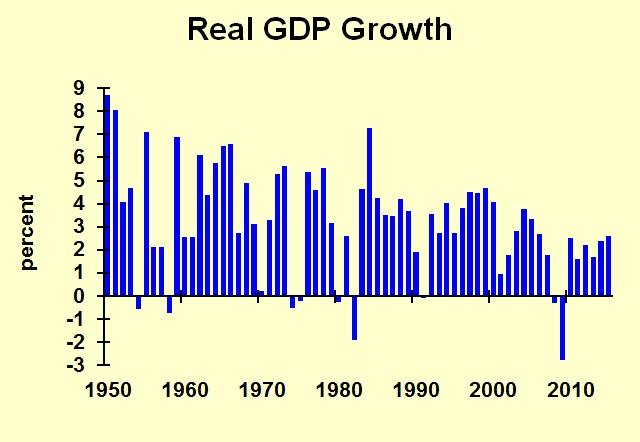Most Americans are disappointed with the two major-party candidates for President. Can the economy grow with poor government policy, which we are almost surely to have whoever wins the election? I believe so, because the positive forces don’t require good political leadership. It’s not certain, though, that the positive forces will overcome political obstacles to growth.
Governance can make a difference in an economy. Compare North Korea to South Korea for the extreme case, and keep in mind that South Korea’s government has plenty of harmful cronyism. Or consider India, a country that has tremendous potential—and has had that potential for many years of protectionist laws.

Although India is an example of a country with good potential but bad performance because of poor policy, note that its income per capita of $6,200 is hugely higher than that of Zimbabwe ($2,100) or North Korea ($1,800). In other words, it could be worse.
Poor governance conflicts with naturally occurring positive forces, but it’s not a winner-take-all battle. Countries like Switzerland, Australia and the United States don’t have perfect policies, but the positive forces have been much stronger, allowing high and growing incomes. Those positive forces are present everywhere—it’s just a question of how much they are suppressed.
Positive forces for growth begin with people’s desire to be more comfortable and to provide a better life for their families. Most folks get up in the morning and go to work. That’s true in Cuba as well as 90 miles north.
The next positive force is that people not only work, but they seek out better opportunities. The migration of poor people from China’s rural areas to its cities is an example, or Bangladeshis’ search for factory jobs that pay more than farm work, or U.S. Millennials who re-educate themselves for software jobs.
The next positive force is copy-cat entrepreneurship. Some people look for better opportunities by opening a business. Most often they simply copy the example of another successful business. An immigrant sees her friend succeed with a small donut shop, so she opens her own. A store clerk visits his home town and sees that it lacks a market, so he opens one.











Leave A Comment